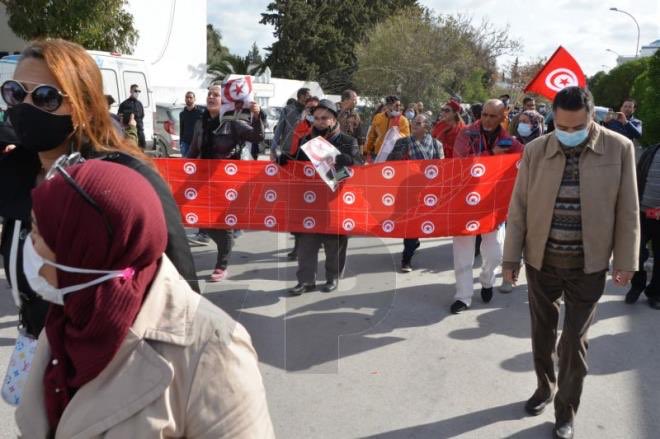
Tunisian President Kais Saied officially dissolved the Supreme Judicial Council on Feb. 6, sending police to seal the chamber where the body meets. The Council’s head, Youssef Bouzakher, called the dissolution “illegal,” and said it is aimed at bringing Tunisia’s jurists under control of the executive. Established in 2016, the Council is a constitutional body entrusted with ensuring the independence of the judiciary, responsible for appointing judges and taking disciplinary action. Bouzakher said the Council intends to continue working in defiance of the president’s announcement.
Saied’s move comes amid growing unrest, with protesters taking to the streets in defiance of a ban on all demonstrations as an ostensible COVID-19 containment measure. January saw mass protests in Tunis commemorating the 2011 pro-democracy uprising. At least one was killed in last month’s protests, according to campaign group Citizens Against the Coup. Protests again erupted on the same day Saied dissolved the Judicial Council, marking the 2013 assassination of progressive opposition leader Chokri Belaid.
On July 25, 2021, Saied seized near-total powers, dismissing his cabinet, dissolving the parliament, revoking the immunity granted to legislators, and assuming the role of the public prosecutor. Critics have termed the power-grab a “self-coup” that violates the Tunisian constitution. (Jurist, Al Jazeera, Al Jazeera, Al Jazeera, DW, MENAFN, Tunis Afrique Presse, Reuters, Amnesty International)
See our last report on the political crisis in Tunisia.
Photo: XLR Media via Twitter





Tunisia: parliament dissolved, lawmakers under investigation
Political crisis in Tunisia has intensified following President Kais Saied’s decision to dissolve the parliament after freezing it in a power grab last July. The decree came on March 30, hours after lawmakers held a plenary session online and voted to end his exceptional measures, which include suspension of the chamber and the sacking of the prime minister, along with the seizure of legislative and judicial powers.
Tunisia’s justice minister has since launched a criminal investigation into members of the now-dissolved parliament who took part in the online session. As many as 121 out of 216 of the participants were summoned for questioning by a special judicial anti-terrorism unit on April 1. (Al Jazeera)
Tunisia: new constitution expands executive power
Tunisian citizens voted July 25 to adopt a new constitution drafted by President Kais Saied which greatly expands the president’s powers. In an election with only 25% turnout due to a boycott, the constitution was adopted by over 90% of voters. In addition to eroding the independence of the judiciary, the new constitution eliminates human rights and gender equality safeguards that were included in the 2014 constitution. (Jurist)
Tunisia: president urged to resign after ‘fiasco’ election
Tunisia’s main opposition coalition has said President Kais Saied must resign after fewer than 9% of eligible voters took part in parliamentary elections. The National Salvation Front head, Nejib Chebbi, said the Dec. 17 poll was a “fiasco,” calling for mass protests to demand snap presidential elections. The vote was boycotted by most opposition parties. (BBC News)
Tunisian court sentences opposition leader Ghannouchi
A Tunisian court sentenced Rached Ghannouchi in absentia to one year in prison May 15. Ghannouchi is the leadig opposition figure in Tunisia and head of the Ennahda party. He was arrested in April on charges of “incitement to violence” after police raided his home. Ghannouchi refused to attend the proceedings against him, saying that the charges were fabricated and the trial was political.
The charges concerned a eulogy delivered by Ghannouchi in the city of Gabes in which he advocated for the rights to freedom of speech and expression. Following his arrest, authorities closed the offices of his Eahda party throughout the country. Ghannouchi is among more than 20 political opponents and personalities, including former ministers and business figures, arrested since February. (Jurist, AfricaNews)
Tunisian opposition leader Ghannouchi on prison hunger strike
Tunisian opposition leader Rached Ghannouchi began a hunger strike Feb. 19 in solidarity with other anti-government figures waging a protest fast to demand their immediate release, his Ennahda party said. (MEE)
Tunisian opposition figure sentenced to prison
The Court of First Instance of Tunis sentenced prominent opposition figure Jawher Ben Mbarek to six months in prison, his sister and lawyer Dalila Ben Mbarek Masddek announced in a live video on Facebook on Feb. 24. The case was brought by the Independent Higher Authority for Elections (ISIE) regarding Ben Mbarek’s criticism of the 2022 elections, which he said amounted to a “farce.” Ben Mbarek was previously detained last year on charges of conspiracy against state security charges. (Jurist)
Tunisia: ex-president sentenced to prison
The Tunis Court of First Instance sentenced former president Moncef Marzouki in absentiaon Feb. 23 to eight years in prison, according to a statement from the court to Tunisia’s state news agency. The charges against Marzouki, who lives in Paris, are based on statements that authorities say violated laws against incitement and advocating the overthrow of the government, as outlined in Article 72 of the Tunisian Penal Code.
After serving as Tunisia’s first democratically elected president from 2011 to 2014, Marzouki emerged as a vocal critic of President Kaïs Saied. Marzouki, denouncing Saied’s is closure of parliament in 2021 as a “coup.” (Jurist)
Tunisia: verdict in Chokri Belaïd assassination
The Tunisian judiciary on March 26 delivered its verdict in the highly publicized case of the assassination of opposition figure Chokri Belaïd. The trial involved a total of 23 defendants. In its decision, the court sentenced four defendants to death and handed down life sentences to two others. In addition, prison sentences ranging from two to 120 years were handed down to other defendants,.
There is now hope now that the case of Mohamed Brahmi will also receive its deserved attention from the courts. Brahmi, another opposition figure, was killed with the same weapon used in the assassination of Chokri Belaïd six months earlier. (Jurist)